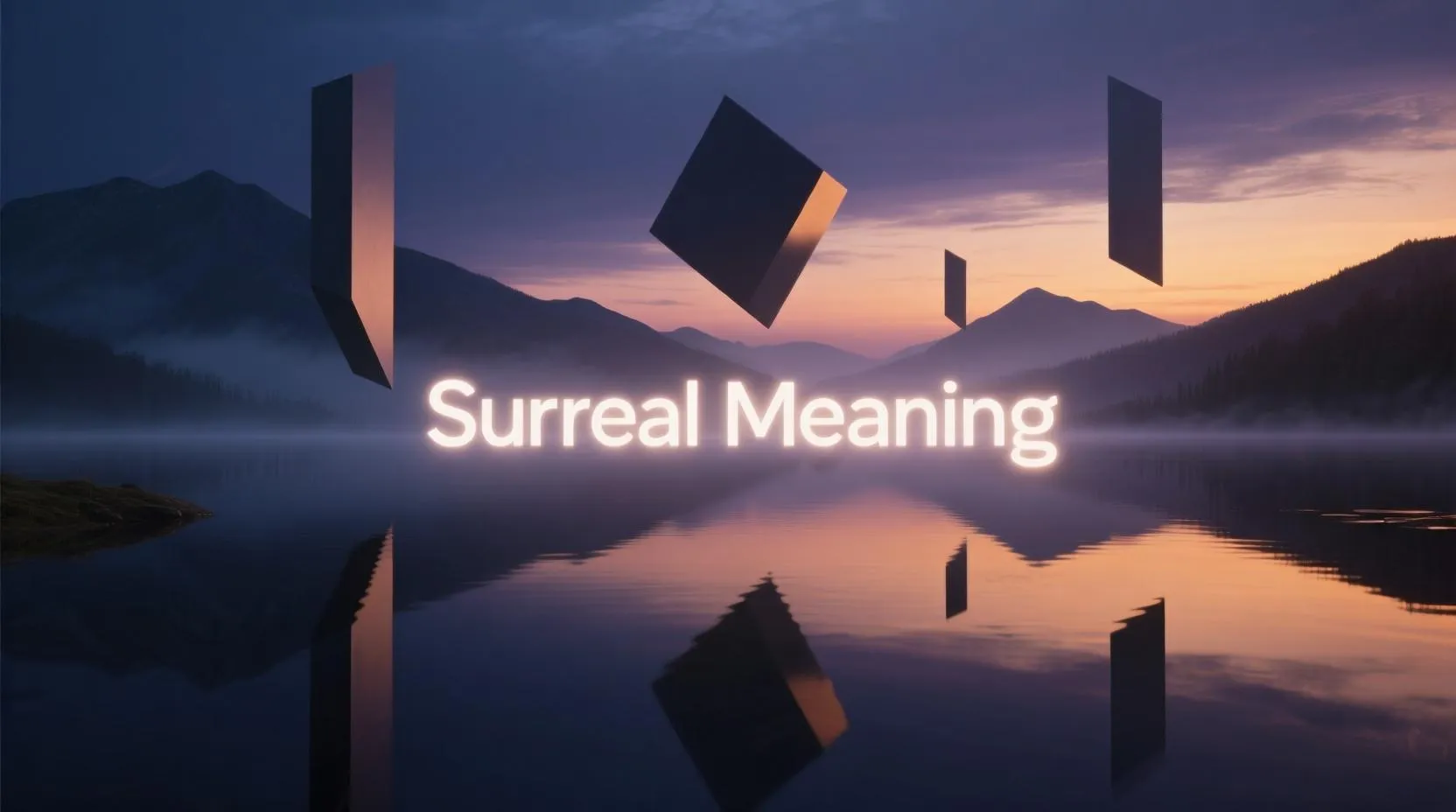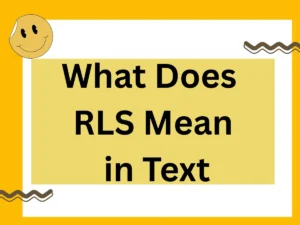Language is fascinating because certain words capture emotions and realities we struggle to describe. One such word is “surreal.” People often say things like “it feels surreal” or “life is surreal” when they’re overwhelmed, shocked, or experiencing something that seems dreamlike.
🔥 Rizz Line Generator 🔥
But what does surreal meaning actually cover? Is it just about art, or does it go deeper into how we describe experiences? In this article, we’ll explain this term fully, explore its origin, dive into different contexts, and reveal why it has become a powerful part of everyday language.
Let’s begin our deep dive into the surreal meaning in English and beyond.
Surreal Meaning in English
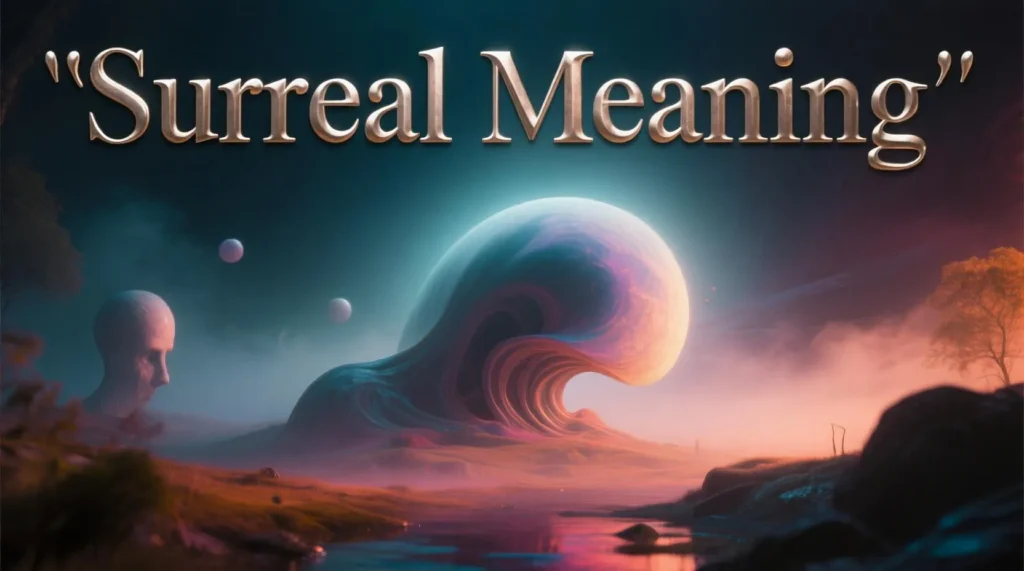
The word “surreal” is an adjective that refers to something bizarre, dreamlike, or unreal yet strangely familiar. It often describes experiences, images, or feelings that seem too unusual or out-of-place to be real.
In everyday English:
- Surreal meaning is linked with anything that feels dreamlike or unbelievable.
- It can be positive (meeting your childhood hero was surreal) or unsettling (waking up in an empty city feels surreal).
- It carries a mix of reality and unreality.
👉 Example:
“Walking into the stadium with thousands cheering—it was so surreal.”
Here, the speaker means the moment felt beyond ordinary reality—almost like a dream.
Surreal Meaning in Different Languages
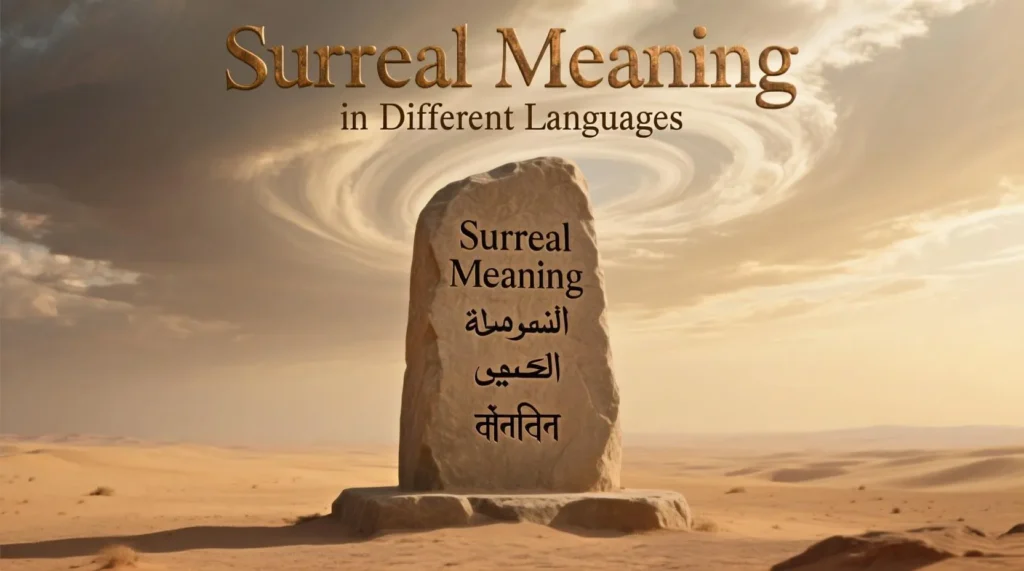
Words like surreal often take deeper significance in different cultures. Let’s break down how it’s expressed globally.
| Language | Translation | Usage/Notes |
|---|---|---|
| Urdu | سراسر خواب نما / غیر حقیقی (Surreal meaning in Urdu) | Often used in poetry, describing dreamlike or unbelievable moments. |
| Hindi | अवास्तविक / स्वप्निल (Surreal meaning in Hindi) | Associated with feelings that blend fantasy and reality. |
| Tamil | சூரியலிசம் (Surreal meaning in Tamil) | Used in art and daily speech to explain unusual, dreamlike experiences. |
| Marathi | अतिवास्तव (Surreal meaning in Marathi) | Highlights something beyond the ordinary, often emotional or artistic. |
This shows that surreal is a universal concept—though expressed differently, the core idea of “dreamlike unreality” remains constant.
The Origin of the Word “Surreal”
To fully explain this term, we need to go back to its roots.
- Origin: The word “surreal” comes from the French surréalisme, coined by poet Guillaume Apollinaire in 1917.
- Literal meaning: Sur- means “beyond” and réalisme means “realism.”
- First use in English: Early 20th century, linked to Surrealist art and literature.
👉 Important Note: The word initially described a cultural movement in art before becoming common in slang and everyday speech.
Surreal Meaning in Art
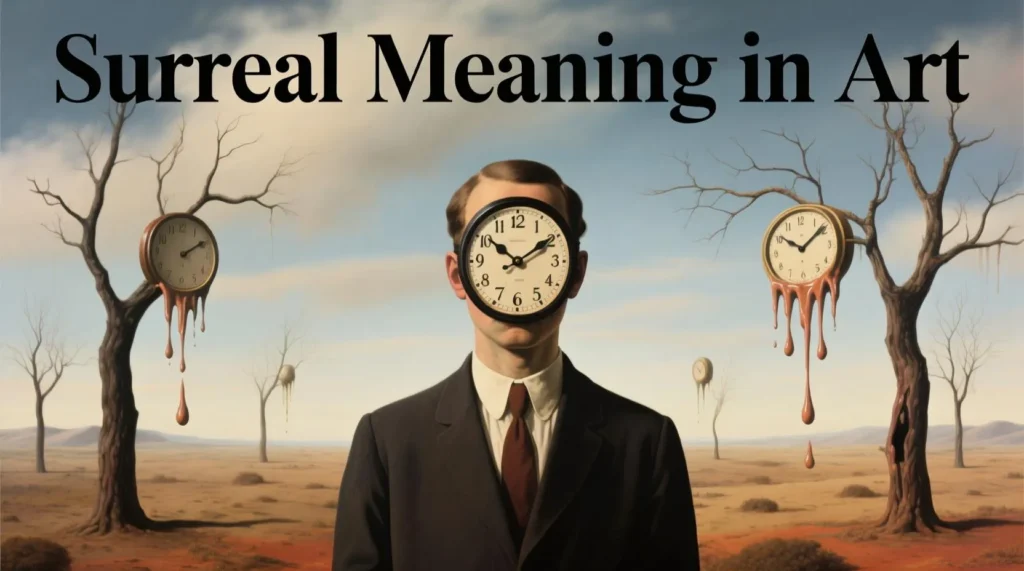
In art and literature, surrealism refers to works that:
- Combine reality and dreamlike imagery.
- Defy logic, structure, and natural rules.
- Create unsettling yet fascinating worlds.
Surreal meaning in art often connects to Salvador Dalí, René Magritte, and André Breton. Their works portrayed melting clocks, floating objects, or distorted human forms—things that feel familiar yet completely illogical.
👉 Example:
- Dalí’s painting The Persistence of Memory (1931) shows melting clocks in a desert. This surreal art piece reflects how time feels strange in dreams.
So, when people describe something as “surreal,” they unconsciously connect it to this art movement of bending reality.
Surreal Meaning in Slang and Daily Life
Over time, surreal meaning slang has shifted. People don’t always use it in an artistic sense anymore. Instead, it’s used in conversations, captions, and storytelling.
- “It’s surreal” → unbelievable, overwhelming, dreamlike.
- “Feels surreal” → an experience is beyond words, hard to process.
- “So surreal” → adds emphasis to just how strange or amazing something is.
👉 Examples in slang:
- “Graduating after all these years… it feels so surreal.”
- “Meeting them in real life after texting for years was surreal AF.”
This shows how surreal bridges formal art history and modern slang.
Common Phrases and Their Meanings
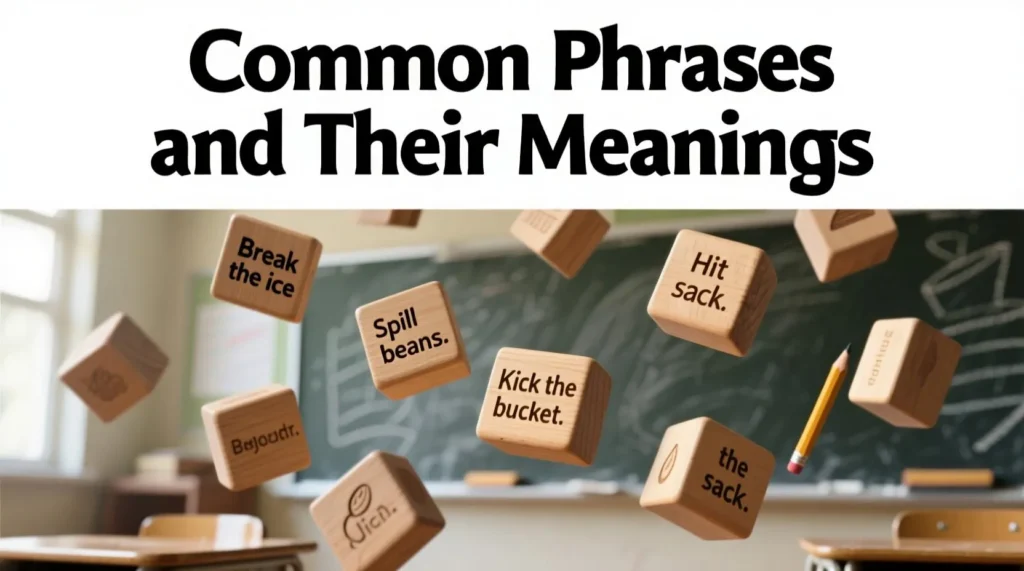
Let’s break down the popular variations of the term and what people usually mean when they use them.
| Phrase | Meaning |
|---|---|
| It feels surreal meaning | Something unbelievable or dreamlike. |
| Feels so surreal meaning | A stronger way of saying “it doesn’t feel real.” |
| It’s surreal meaning | Used as slang for shock, amazement, or confusion. |
| It’s so surreal meaning | Emphasis on an event or moment feeling unreal. |
| Felt surreal meaning | Looking back, the event seemed dreamlike. |
| Feeling surreal meaning | Currently experiencing a bizarre or unreal sensation. |
| Everything feels surreal meaning | Life or a situation feels strange, like a dream. |
| Life is surreal meaning | Life feels unpredictable, beyond understanding. |
👉 Example sentence:
“When I held my newborn for the first time, everything felt surreal.”
Why Do People Say “Surreal”?
Why not just say unbelievable or unreal? Because surreal carries deeper emotional weight.
- Unreal = something fake or not true.
- Surreal = something dreamlike yet happening in real life.
That’s why people use it during major life events, such as:
- Graduations.
- Weddings.
- Winning an award.
- Surviving an accident.
- Meeting someone famous.
It blends emotion + reality distortion, making it more powerful than just saying “unreal.”
Examples of Surreal in Literature and Culture
To better understand, let’s explore how surreal meaning art and literature shaped the way we use it today.
- Franz Kafka’s novels → Often described as surreal because they mix everyday life with bizarre twists (The Metamorphosis where a man wakes up as an insect).
- Movies → Films like Inception, Eternal Sunshine of the Spotless Mind, and Pan’s Labyrinth are described as surreal cinema.
- Music → Lyrics by bands like Pink Floyd often carry surreal imagery that feels dreamlike.
This cultural usage explains why the word feels natural in modern speech.
Surreal vs. Unreal vs. Bizarre
People often confuse these words. Here’s a quick comparison:
| Word | Meaning | Example |
|---|---|---|
| Surreal | Dreamlike but real | “The concert was surreal—I couldn’t believe I was there.” |
| Unreal | Not real, imaginary | “That magic trick was unreal.” |
| Bizarre | Strange, odd, weird | “The painting had bizarre shapes and colors.” |
👉 Tip: Use surreal when you want to highlight an experience that’s real but feels like a dream.
How to Use “Surreal” in Sentences
Here are some simple yet powerful examples:
- “Standing at the edge of the Grand Canyon was so surreal.”
- “After months of hard work, winning the award felt surreal.”
- “It’s surreal how fast life can change.”
- “Living through this moment, everything feels surreal.”
- “The film’s visuals gave me a surreal experience.”
Modern Popularity of the Word
In 2025, the term “surreal” has become more common than ever, thanks to:
- Social media captions → “This trip is surreal 😍.”
- News headlines → “Residents describe the scene as surreal after the storm.”
- Pop culture → Influencers and celebrities use it to describe big life events.
This trend shows that surreal meaning slang has moved from artistic niche to mainstream emotion.
Quick Facts About Surreal
- First appeared: 1917 (Apollinaire).
- Movement: Surrealism in art/literature (1920s).
- Modern use: Everyday slang for dreamlike/unbelievable events.
- Related words: Unreal, dreamlike, fantastic, bizarre.
- Opposite words: Ordinary, real, expected.
Final Thoughts on Surreal Meaning
The word “surreal” is more than just vocabulary—it’s an emotional lens. It helps us describe those rare, dreamlike, unbelievable moments that shape our lives.
- In art, it represents a movement that challenged reality.
- In life, it helps us express shock, joy, or confusion.
- In slang, it has become a shortcut for saying “this feels too unreal to be happening.”
👉 So next time you say “it feels surreal”, remember you’re using a word with over a century of history, carrying deep cultural, emotional, and artistic weight.


